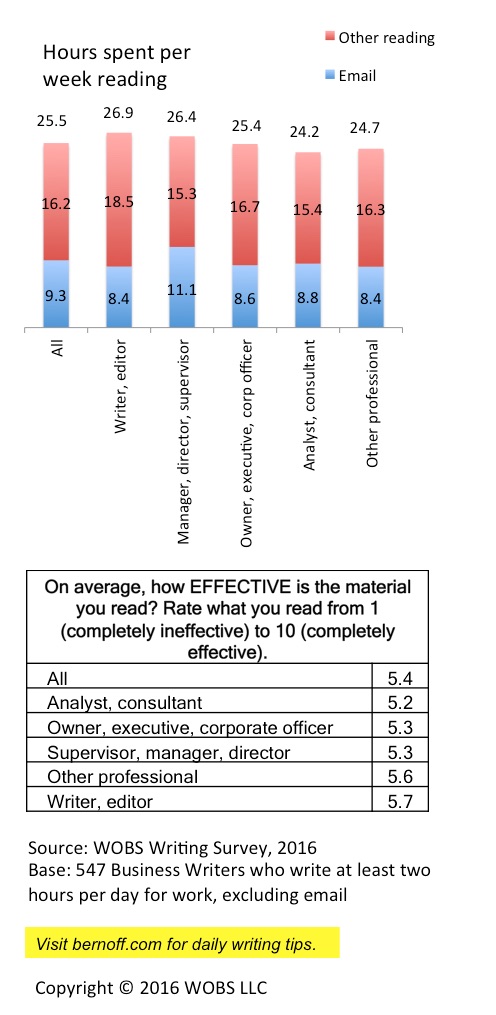How managers can improve the business writing culture (Survey Data)
As I’ve reviewed the data from the WOBS Writing Survey, one thing stood out: managers read a lot, and they think the quality of business writing is poor. By improving the writing culture in their departments, they could save themselves and their workers a lot of time.
The data shown here comes from my survey early this year of 547 business writers. The top question shows the time people with different job descriptions spend writing, while the bottom is how they rate the effectiveness of what they read, on a 1 to 10 scale.

Here’s what this data is telling us.
- People read a lot — more than 25 hours per week. And after writers and editors, it’s managers, directors, and supervisors who spend the most time reading (and suffering). The average manager in our survey spends 11 hours a week reading email and 15 more hours reading other stuff.
- The quality of what people read is poor. Overall, business writers rate the effectiveness of what they read at only 5.4 on a ten-point scale. Managers, supervisors, and directors find the material they read to have even worse quality than general business writers do.
What you should do about the poor quality of writing
Short of a movement to improve business writing everywhere (I’m working on it, but don’t hold your breath), this won’t change unless you change it. And the right place to start is at the managerial level.
Managers will improve their own and their workers productivity by encouraging their workers to be efficient with what they write. This starts with improving their own writing. Here are three suggestions for how to quickly improve writing quality in your department:
- Improve email subject lines and brevity. Develop a departmental culture that emails must follow two rules: all subject lines must succinctly and accurately describe email content (“quarterly sales figures”, not “new data” or “a word from the sales manager”), and all emails must be 250 words or fewer. If you’re reading emails 11 hours a week, this will save you a lot of time and improve your department’s productivity as well.
- Mandate edit passes on all shared content. If a dozen or more people will read something — like a report or memo — then you or an editor you designate should edit it. Your designated editor should concentrate on titles, front-loading (key information in first two sentences), and keeping things as short as possible.
- Suggest ways to structure content. One reason writing is so ineffective is that it’s hard to skim. Anything longer than a page needs structure — subheads, bullets, tables, or graphics. As a manager, you should suggest these improvements on anything that you read (or are forced to read).
If you’re still stuck on how to accomplish these goals, feel free to give me a call — I’ve got more ideas for you.